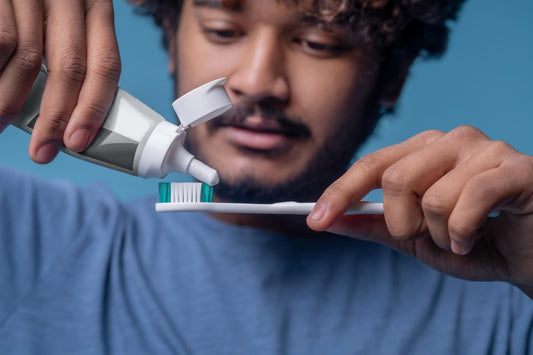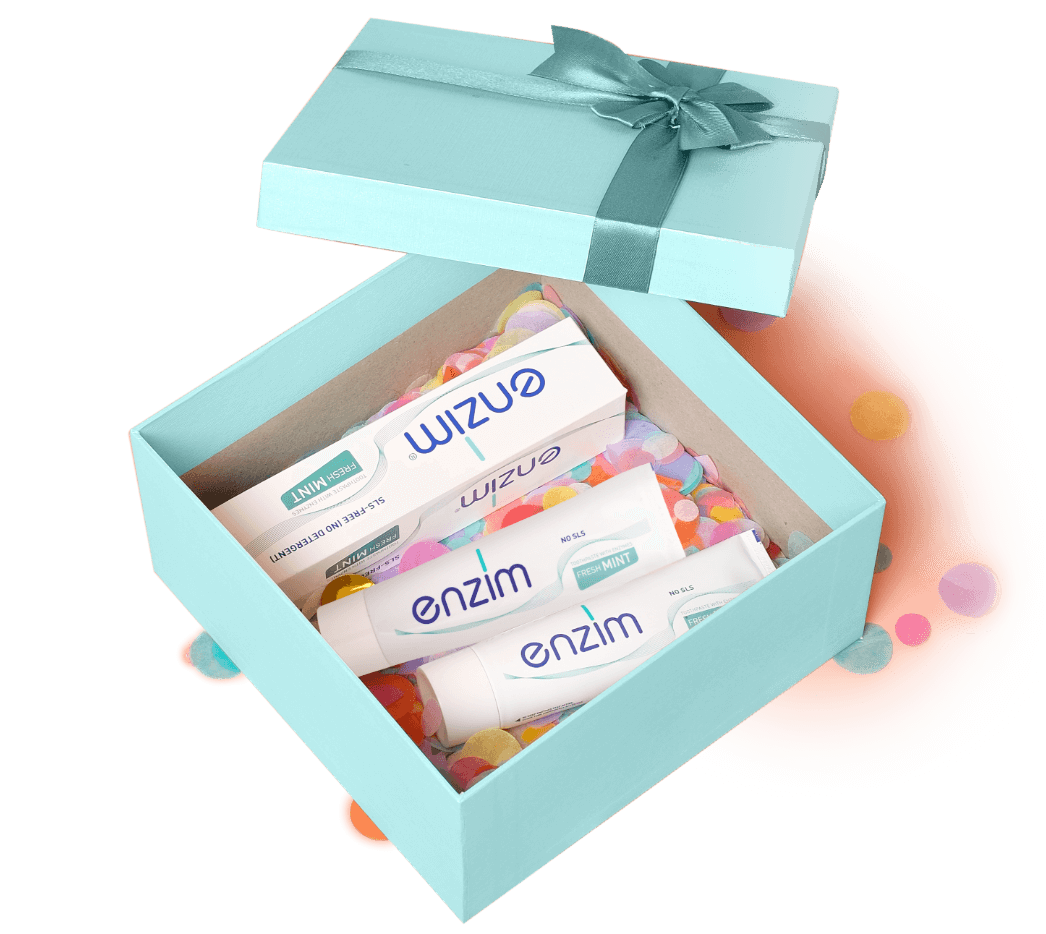Whitening Toothpaste and Its Impact on Receding Gums

Whitening Toothpaste and Its Impact on Receding Gums - Enzim Singapore
In this article, we’ll explore how whitening toothpaste works, its potential effects on receding gums, and how to use it safely if you have this condition.
What is Whitening Toothpaste?
Whitening toothpaste generally works in two primary ways:-
Abrasives: These are mild polishing agents that help scrub away surface stains. Common abrasives include silica, calcium carbonate, and aluminum oxide. These abrasives are typically not harsh enough to damage tooth enamel but can effectively remove staining from the surface.
-
Chemical Agents: Ingredients like hydrogen peroxide or carbamide peroxide are common in whitening formulas. These agents break down stains on a chemical level, especially for deep stains that may not be easily removed by brushing alone.
Whitening toothpaste can be highly effective at improving the appearance of your teeth by lightening's stains, but there are concerns about how it interacts with sensitive gum tissue, especially in people with receding gums.
How Receding Gums Affect Your Oral Health
Receding gums occur when the gum tissue around the teeth pulls back, exposing the tooth roots. This condition can result from factors like poor oral hygiene, aggressive brushing, gum disease, genetics, or aging. When the gums recede, the exposed tooth roots become more vulnerable to damage and can lead to increased sensitivity, decay, and even tooth loss if left untreated.For individuals with receding gums, it’s essential to be extra cautious about the products used in their oral care routine, especially whitening toothpaste, as it can have varying effects on the delicate gum tissue.
Potential Risks of Whitening Toothpaste for Receding Gums
While whitening toothpaste can improve the appearance of your teeth, it may not always be the best choice for people with receding gums due to the following concerns:1. Increased Tooth Sensitivity
One of the most common issues for people with receding gums is increased tooth sensitivity. The exposed tooth roots lack the protective enamel that covers the crowns of teeth, making them more vulnerable to temperature changes, acidic foods, and certain oral products.Whitening toothpastes, particularly those containing hydrogen peroxide or strong abrasives, may exacerbate sensitivity by further irritating the exposed roots. The abrasive particles can also cause microscopic damage to the delicate gum tissue around the roots, which can increase discomfort when brushing.
2. Gum Irritation
Whitening toothpastes that contain strong abrasives or chemical ingredients may irritate sensitive gum tissue, especially for those with receding gums. This can lead to inflammation, tenderness, and further damage to the gums. In severe cases, it can worsen gum recession, making the problem even more pronounced.3. Enamel Erosion
Enamel erosion is a concern for anyone using whitening toothpaste, but it can be even more problematic for those with receding gums. When the gums pull back, the tooth roots are exposed, and these areas are not protected by enamel. Abrasive whitening toothpastes can wear down the outer layer of the teeth, especially the areas that are already vulnerable due to gum recession. This may increase the risk of cavities or further gum recession.How to Safely Use Whitening Toothpaste if You Have Receding Gums
Although whitening toothpaste may not be the ideal option for everyone with receding gums, there are ways to use it safely and minimize potential risks. Here are a few tips:1. Choose a Gentle Whitening Toothpaste
If you have receding gums, opt for a gentle, low-abrasive whitening toothpaste. Look for formulations that are specifically designed for sensitive teeth, as these tend to be less harsh on both the gums and enamel. Toothpastes with potassium nitrate or calcium carbonate are often milder and can provide effective whitening without causing excessive abrasion.2. Avoid Overuse
Whitening toothpastes can be more abrasive than regular toothpaste, so it’s important not to overuse them. Limit your use to a few times per week instead of using whitening toothpaste every day. This can help reduce the risk of gum irritation and enamel erosion while still allowing you to maintain a brighter smile.3. Use a Soft-Bristled Toothbrush
A soft-bristled toothbrush is essential when you have receding gums, as it’s less likely to irritate or damage the sensitive gum tissue. Pair this with a gentle brushing technique to avoid further damaging your gums. Make sure to use a light touch and avoid scrubbing too hard.4. Consider Other Whitening Methods
If whitening toothpaste causes discomfort or worsens your gum sensitivity, you might want to explore alternative whitening options. Professional whitening treatments at the dentist's office can be a gentler and more effective way to brighten your smile without putting strain on your gums. Additionally, over-the-counter whitening strips or gels that don’t contain harsh abrasives may be a better choice for people with receding gums.5. Consult Your Dentist
Before incorporating whitening toothpaste into your oral care routine, especially if you have receding gums, it’s important to consult with your dentist. They can recommend the most suitable products for your oral health and advise on the best whitening methods that won’t aggravate your gum recession.Conclusion
While whitening toothpaste can effectively improve the appearance of your teeth, it’s important to be cautious if you have receding gums. The abrasives and chemicals in some whitening formulas may exacerbate sensitivity, irritate your gums, or lead to further enamel erosion. To minimize these risks, choose a gentle whitening toothpaste, use it sparingly, and always prioritize your gum health.If you're dealing with receding gums, consider alternatives like professional whitening treatments or gentler over-the-counter products. The key is to find a balance between achieving a bright smile and protecting your sensitive gums. Always consult with your dentist for personalized recommendations and advice.



